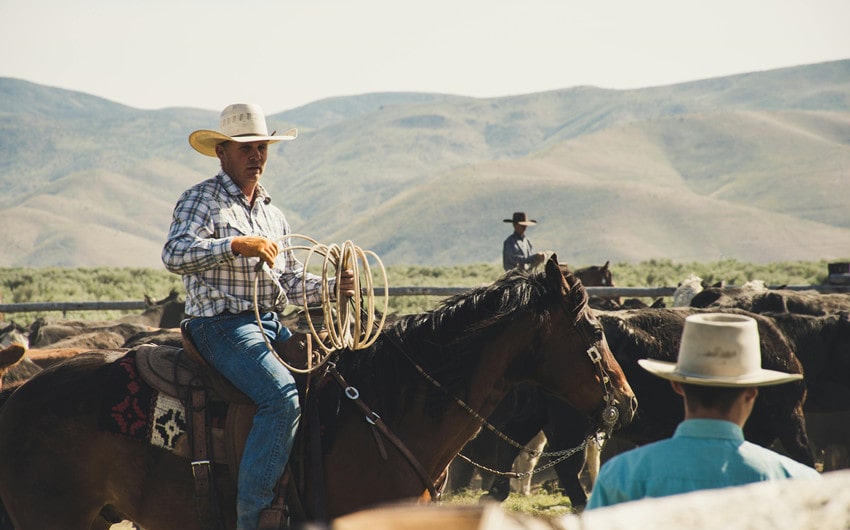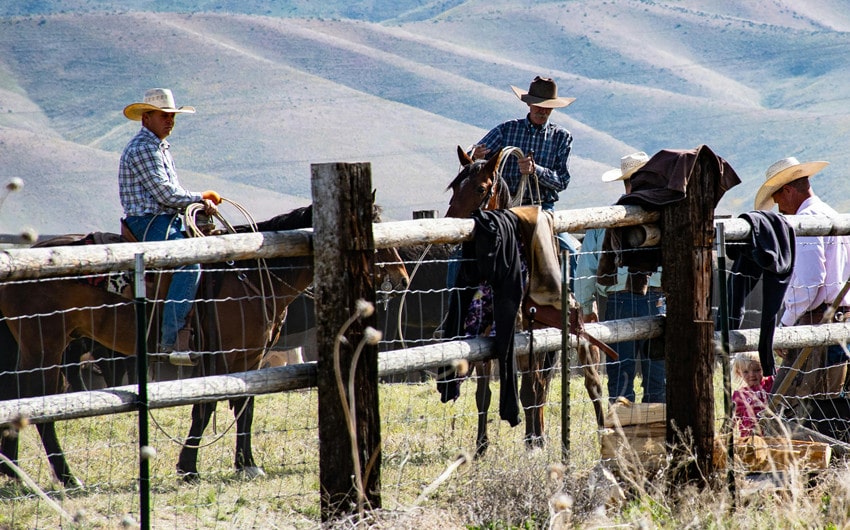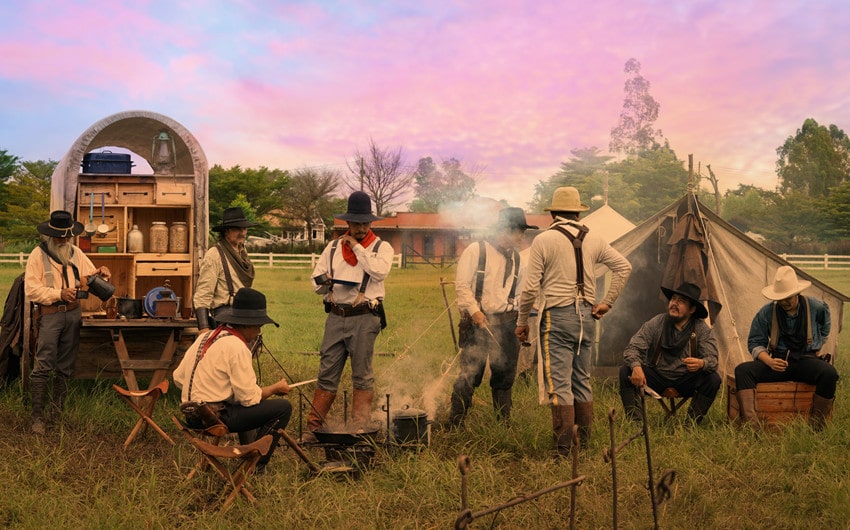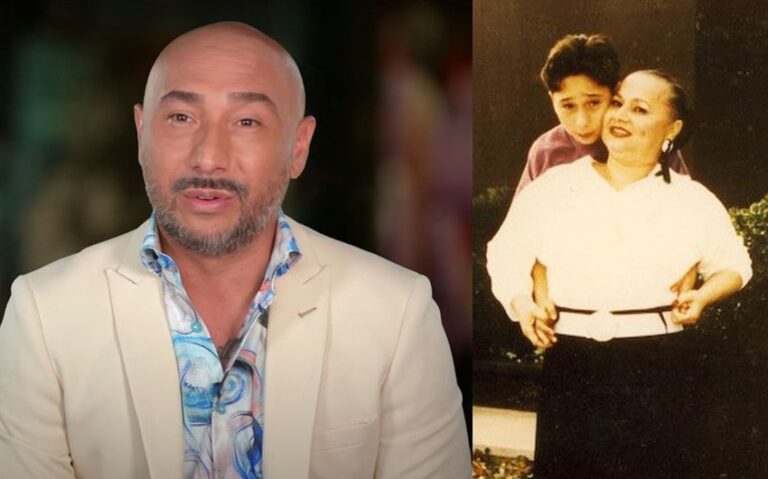Cowboy Slang Terms and Expressions for Any Western Fan
Cowboy slang is a colorful and fascinating part of American history that brings the Wild West to life. From the dusty trails to lively saloons, cowboys had their own way of talking that added flair to their rugged lifestyle. If you’ve ever wondered what phrases like “howdy” or “all hat and no cattle” mean, you’re in the right place.
In this article, we’ll dive into some of the most interesting and authentic cowboy terms and expressions. Whether you’re a history buff or just curious, you’ll enjoy learning these fun and quirky sayings.
Common Cowboy Slang Terms and Their Meanings

1. Howdy
A casual greeting, equivalent to “hello” or “hi,” commonly used by cowboys. It is short for “How do you do?” and reflects the friendly, informal nature of cowboy culture. This term became popular across the American West as cowboys used it to greet each other on the trail or in town.
2. Y’all
A contraction of “you all,” used to address a group of people. It’s a common term in Southern and Western dialects and embodies the inclusive, community-focused spirit of cowboy society. Cowboys would often use this term when speaking to fellow ranch hands or townsfolk.
3. Reckon
Means “to think” or “suppose.” Often used when giving an opinion or making a guess. For example, a cowboy might say, “I reckon it’s going to rain,” indicating a thoughtful or educated guess based on observation. This term reflects the pragmatic and contemplative nature of cowboy life.
4. Chaw
Refers to chewing tobacco. Cowboys often carried a pouch of chewing tobacco, which they would chew for relaxation or to pass the time while riding or working on the ranch. It was a common habit among men of the Old West and part of the cowboy’s rugged persona.
5. Grub
Another word for food or a meal. Cowboys had to be resourceful and often ate simple, hearty meals on the trail, such as beans, biscuits, and coffee. The term “grub” reflects the down-to-earth, no-frills lifestyle of the cowboy.
6. Ride the river
Means to undertake a difficult task or to be dependable in tough situations. This phrase comes from the challenging nature of crossing rivers on horseback, which required skill and bravery. A cowboy who could “ride the river” was seen as trustworthy and capable.
7. Barn Sour
Refers to a horse that is reluctant to leave the barn or wants to return quickly. This term is used to describe someone who is homesick or not willing to venture far from home. In cowboy culture, a “barn sour” horse could be problematic, as it showed a strong preference for the comfort and safety of its barn, mirroring how some people might feel about leaving their familiar surroundings.
8. High-falutin’
An adjective describing someone who is arrogant or has high pretensions. Cowboys valued humility and straightforwardness, so someone who was “high-falutin’” was seen as putting on airs or acting superior without justification.
9. Cowpoke
Another term for a cowboy, particularly one who herds cattle. It highlights the cowboy’s primary job of moving cattle from one place to another, often poking or prodding them with a stick or riding crop to keep them moving.
10. Bunkhouse
The building where cowboys sleep on a ranch. It was typically a simple, communal living space with bunk beds and minimal amenities, reflecting the rough-and-ready lifestyle of the cowboys who lived and worked there.
11. Corral
An enclosure for confining livestock, especially horses or cattle. Corrals were essential on ranches for managing and sorting animals, and building or repairing them was a common task for cowboys.
12. Chuckwagon
A mobile kitchen used to prepare and serve food on the trail. Invented by rancher Charles Goodnight, the chuckwagon was a vital part of cattle drives, providing meals and a sense of home for cowboys far from their ranches.
13. Bronc
Short for bronco, a wild or untrained horse. Cowboys often had to break in or train broncos for riding, a challenging and sometimes dangerous task that required skill and courage.
14. Dogie
A motherless calf. These young cattle needed special care and attention, often requiring cowboys to bottle-feed them and ensure they grew strong enough to join the herd.
15. Maverick
An unbranded cow, often one that is independent or nonconformist. The term originates from Samuel Maverick, a Texas rancher who refused to brand his cattle. Over time, it came to describe anyone or anything that is unconventional or independent-minded.
16. Greenhorn
A term for a new or inexperienced person, especially in cowboy work. Greenhorns often faced a steep learning curve in the demanding environment of the ranch or the trail, and this term was used to describe their lack of experience and need for training.
17. Ace-High
Refers to something of top quality or excellent. In card games, particularly poker, an “ace” is a high-ranking card, and this term carried over to mean anything considered the best or of superior quality. For cowboys, calling something “ace-high” was a way of praising its exceptional standard, whether it was a horse, a piece of equipment, or even a person.
18. Ace in the Hole
A hidden advantage or resource kept in reserve until needed. This phrase originates from poker, where an ace in the hole can be a powerful card kept hidden until the right moment. For cowboys, having an “ace in the hole” meant having a secret weapon or an unexpected advantage that could be revealed when the situation called for it.
19. Airin’ the Lungs
Talking a lot or giving a long-winded speech. Cowboys used this phrase to describe someone who was talking too much or making a lot of noise. It conjures the image of someone exhaling or “airing out” their lungs excessively by speaking at length, often without much substance.
20. Barn Sour
Describes a horse that is reluctant to leave the barn or stable, often because it prefers the comfort and security of its home environment. This term can also be applied to people who are unwilling to leave familiar surroundings or who exhibit a preference for staying in a familiar, comfortable place rather than venturing out into new or challenging situations.
21. Tenderfoot
A term for a newcomer or inexperienced person, especially in cowboy work. Tenderfoots are often characterized by their lack of skills and knowledge of the cowboy lifestyle. They might struggle with tasks that seasoned cowboys handle with ease, and they often require guidance and training to become proficient in ranch work or on the trail.
22. Too Much Mustard
A phrase used to describe someone who is overly enthusiastic or trying too hard to impress. It suggests that the person is putting on too much show and not enough substance, similar to adding too much mustard to a meal, which can overpower the other flavors. This term highlights the balance between effort and authenticity, cautioning against overdoing it.
23. Varmint
A derogatory term for an animal pest or a troublesome person. It was commonly used by cowboys to refer to predators like coyotes or to describe someone who was causing problems. The term conveys a sense of nuisance and unwelcome presence, whether referring to animals threatening livestock or people causing disruptions.
24. Wobblin’ Jaw
Refers to someone who talks too much or spreads gossip. It implies that the person’s jaw is constantly moving, like a wobbling motion, due to excessive talking. This term is often used to criticize those who are seen as engaging in idle chatter or spreading rumors rather than focusing on productive or meaningful conversation.
Unique Cowboy Sayings and Phrases

1. This Ain’t My First Rodeo
This phrase means “I’m experienced and know what I’m doing.” Cowboys use it to indicate that they’ve been through similar situations before and are not easily fooled or intimidated. It conveys a sense of confidence and competence, suggesting that the speaker has the necessary skills and experience to handle the task at hand.
2. Don’t Squat with Your Spurs On
A humorous piece of advice meaning “don’t do something that will cause you discomfort or trouble.” Spurs are sharp and would make squatting painful, so this phrase advises against actions that are self-defeating or unnecessarily difficult. It’s a reminder to think ahead and avoid creating problems for oneself.
3. Riding for the Brand
This phrase signifies loyalty and commitment to one’s employer or group. It originates from the practice of branding cattle, indicating a cowboy’s dedication to the ranch they work for. When a cowboy is “riding for the brand,” they are showing their allegiance and willingness to defend the interests and reputation of their employer.
4. He’s All Hat and No Cattle
Describes someone who talks big but doesn’t back it up with actions. It criticizes people who are all show and no substance, suggesting that they are more interested in appearances than in actually doing the work. This phrase is used to call out pretenders and braggarts who lack the skills or achievements they claim to have.
5. Slow as Molasses in January
This phrase is used to describe someone or something that is extremely slow. Molasses, a thick syrup, flows very slowly, and in the cold of January, it would be even slower. This colorful comparison emphasizes sluggishness and can refer to both people and processes.
6. Let’s Rustle Up Some Grub
A phrase meaning “let’s get some food” or “let’s prepare a meal.” “Rustle up” implies a sense of effort and improvisation, often associated with the resourcefulness needed to find or prepare food in the rugged cowboy lifestyle. “Grub” is a casual term for food.
7. Knee-High to a Grasshopper
Used to describe someone who is very young or small. This phrase is often employed nostalgically or humorously to refer to the early years of life when someone was “knee-high to a grasshopper,” indicating a time when they were much younger and smaller.
8. Happy as a Clam at High Tide
A saying that means “very happy” or “content.” Clams are safe from predators when the tide is high, so they can be considered “happy” during this time. This phrase draws a parallel between the safety and contentment of clams at high tide and a person’s state of happiness.
9. Don’t Get Your Britches in a Twist
An expression advising someone not to get upset or agitated. “Britches” is an old-fashioned term for pants, and getting them “in a twist” suggests discomfort and irritation. This phrase is a colorful way of telling someone to calm down and not overreact.
10. You Can’t Rope a Wild Horse
Means that some things or people cannot be controlled or tamed. Just as a wild horse resists being roped and broken, this phrase suggests that there are certain situations or individuals that will always remain free-spirited and uncontrollable.
11. The Quickest Way to Double Your Money Is to Fold It Over and Put It Back in Your Pocket
A humorous saying that advises against spending money unnecessarily. It implies that saving money by not spending it is the easiest way to increase one’s wealth. This phrase reflects the practical, frugal mindset often necessary in the cowboy lifestyle.
12. If You Find Yourself in a Hole, the First Thing to Do Is Stop Diggin’
This phrase means that when you’re in trouble, the first step to getting out is to stop making the situation worse. It’s a piece of practical advice emphasizing the importance of recognizing when one’s actions are counterproductive and taking steps to change course.
13. He’s Been Rode Hard and Put Away Wet
Describes someone who looks worn out or exhausted, often from hard work or difficult experiences. This phrase comes from the practice of riding a horse hard and putting it away wet without properly caring for it, which can leave the horse in poor condition. It’s used metaphorically to describe people who appear similarly overworked and neglected.
14. Wild as a March Hare
A phrase used to describe someone who is very wild or unpredictable. Hares are known for their erratic behavior in March, their breeding season, and this comparison suggests a level of wildness and craziness.
15. As Nervous as a Long-Tailed Cat in a Room Full of Rocking Chairs
Describes someone who is extremely nervous or anxious. The image of a cat with a long tail in a room full of rocking chairs conveys a sense of constant danger and unease, suggesting that the person feels highly stressed and on edge.
16. That Dog Won’t Hunt
A phrase meaning that something will not work or is not a good idea. It originates from hunting dogs that are not good at their job, implying that the plan or idea is ineffective or impractical. Cowboys used this saying to quickly dismiss suggestions or strategies they believed would fail, emphasizing the importance of practicality and proven methods in their challenging environment.







